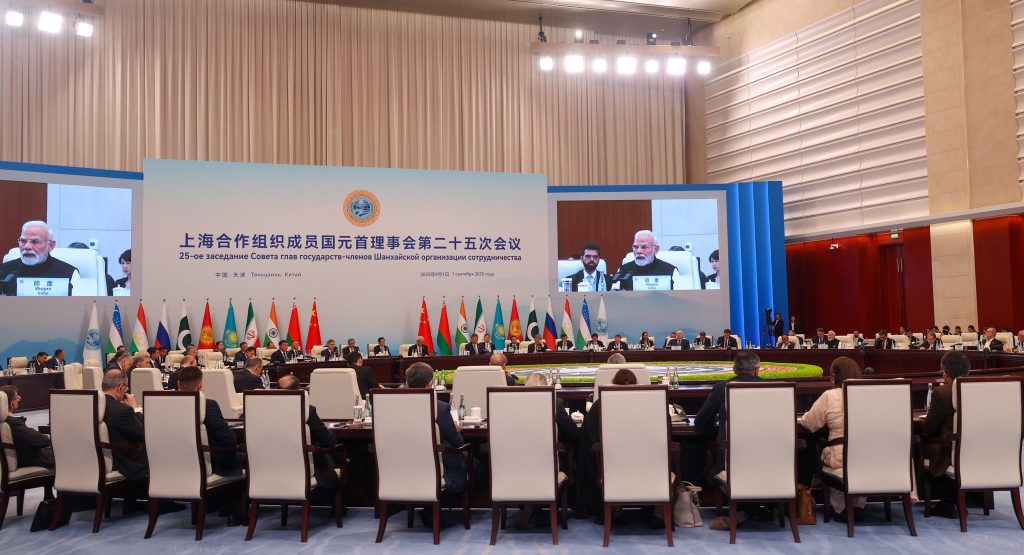
TIANJIN (CHINA): In a triumph of Indian diplomatic skills, the 10-nation Shanghai Cooperation Organisation, jointly condemned Pahalgam terror attack and underlined the imperative for concrete action against cross-border border terror attack and the use of terror by states for advancing their political agenda.
Shedding ambivalence, the SCO, which includes China and Pakistan, strongly condemned the Pahalgam terror attack in India, which killed 26 innocent tourists, and rejected “attempts to use terrorist, separatist and extremist groups for mercenary purposes.”
“The Member States, while reaffirming their firm commitment to the fight against terrorism, separatism and extremism, stress the inadmissibility of attempts to use terrorist, separatist and extremist groups for mercenary purposes,” said the Tianjin Declaration after the annual summit meeting of the Eurasian countries in the Chinese port city of Tianjin on September 1, 2025. “They recognize the leading role of sovereign States and their competent authorities in countering terrorist and extremist threats”
The strongly-worded joint declaration was preceded by an impassioned speech by Prime Minister Narendra Modi at the SCO summit in which he described terrorism as “not only a threat to the security of individual nations, but a shared challenge to all of humanity.” “No country, no society, no citizen can consider themselves completely safe from it. That is why India has consistently stressed the importance of unity in the fight against terrorism,” said Mr Modi
Unveiling a new vocabulary of SCO solidarity PM Modi said that India’s vision of SCO is underpinned by: S – Security; C – Connectivity; O – Opportunity.
Mr Modi’s speech was aimed at rallying the SCO against the use of terror by Pakistan, which is widely suspected of engineering the terror attack in Pahalgam in Jammu and Kashmir to internationalise the Kashmir issue. Pakistan’s Prime Minister Shehbaz Sharif was among the SCO leaders were in attendance when PM Modi warned against double standards in dealing with terror. The message seems to have resonated with the SCO countries, who not only condemned the Pahalgam terror attack, but also agreed to launch a programme of cooperation against radicalisation.
“Can the open support for terrorism by certain countries ever be acceptable to us?,” Mr Modi asked in a veiled but obvious reference to Pakistan’s sponsorship of anti-India terror groups and using them to undermine India’s growth story.
“We must state it clearly and in one voice: double standards on terrorism are unacceptable. Together, we must oppose terrorism in every form and manifestation. This is our responsibility towards humanity,” said PM Modi, the driving force behind India’s audacious action to launch strikes on terror camps in Pakistan in retaliation for the Pahalgam carnage.
The explicit mention of cross-border terror in the Tianjin Declaration is a vindication of India’s position that a forum like the SCO can only be relevant if it can speak in one voice against the scourge of terrorism.
Earlier, India’s Defence Minister Rajnath Singh had refused to sign a joint statement of SCO Defence Ministers meeting in July as it did not include any mention of the Pahalgam terror attack. China was vacillating as it wanted to shield its all-weather ally Pakistan.
Besides supporting India’s position on cross-border terror, the SCO also supported India’s position on global governance reforms and acknowledged India’s civilisational philosophy of “Vasudhaiva Kutumbakam” (the world is one family).
The Tianjin Declaration underlined the need for building a new type of international relations and called for the formation of a common vision of the idea of creating a community of shared future for mankind and developing dialogue on the idea of “One Earth. One Family. One Future.” The SCO countries called on the international community to join the SCO Initiative “On Global Unity for a Just World, Harmony and Development.” The idea of “One Earth. One Family. One Future” emanated from the motto of India’s G20 presidency which in turn was inspired by “Vasudhaiva Kutumbakam.” In a signal to the West, which continued to dominate the global governance institutions, the SCO countries called for the “formation of a more representative, democratic, just and multipolar world order.”
Author Profile

- Manish Chand is Founder and Editor-in-Chief of India Writes Network (www.indiawrites.org) and India and World, a pioneering magazine focused on international affairs. He is CEO, Centre for Global India Insights, an India-based think tank focused on global affairs.
Latest entries
 India and the WorldFebruary 17, 2026South-by-South: Focus on people-centric solutions at India AI summit
India and the WorldFebruary 17, 2026South-by-South: Focus on people-centric solutions at India AI summit India and the WorldFebruary 7, 2026Modi hails interim India-US trade deal, Goyal says no concessions made on agriculture
India and the WorldFebruary 7, 2026Modi hails interim India-US trade deal, Goyal says no concessions made on agriculture India and the WorldFebruary 2, 2026Trump announces trade deal with India, Modi ‘delighted’
India and the WorldFebruary 2, 2026Trump announces trade deal with India, Modi ‘delighted’ India and the WorldJanuary 31, 2026Palestinian minister bats for mediatory role for India in ending Gaza conflict
India and the WorldJanuary 31, 2026Palestinian minister bats for mediatory role for India in ending Gaza conflict







